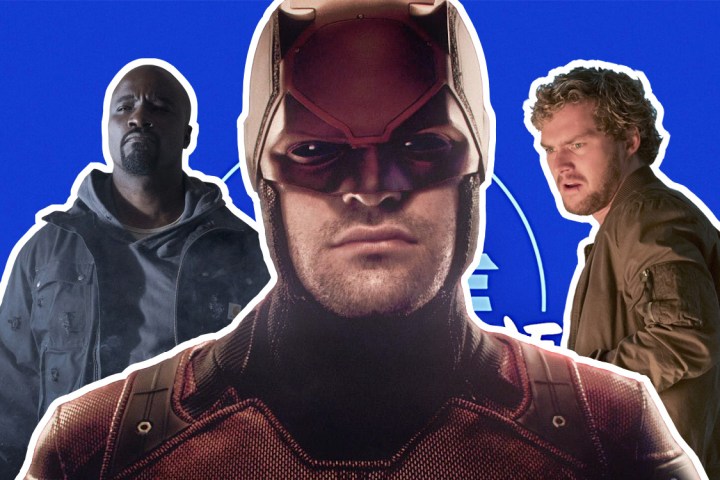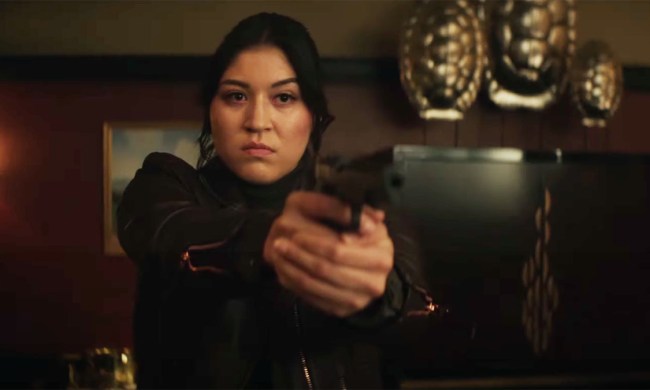
Following the cancelation of Daredevil, Luke Cage and Iron Fist, the end of Marvel’s gritty, street-level superhero universe on Netflix appears imminent. Despite the initial announcement from Netflix leaving the door open for more projects featuring the shows’ characters, these particular incarnations of the series’ heroes (and villains) are almost certainly being shelved.
Or maybe not.
Asked whether Disney would consider reviving the Netflix series on its forthcoming streaming video service Disney Plus, the chairman of Disney’s direct-to-consumer and international division, Kevin Mayer, told The Hollywood Reporter that the rumors regarding Daredevil‘s demise (and the demise of the rest of the canceled shows, for that matter) might have been exaggerated.
“They are very high-quality shows,” said Mayer when asked about whether Disney has plans to revive the canceled Netflix shows. “We haven’t yet discussed that, but I would say that’s a possibility.”
And just like that, the futures of street-level heroes Daredevil, Luke Cage, and Iron Fist, as well as their supporting cast from each of their shows, and the not-yet-canceled (but widely expected to be canceled) Jessica Jones and Punisher series, all seem brighter.
Before fans of the series get carried away celebrating this glimmer of hope, though, it’s worth considering that the notion of bringing Marvel’s Netflix-verse more completely into the Marvel Cinematic Universe comes with a fair share of pros and cons to consider in equal measure.
Big-time team-ups
On the positive (and most obvious) side, bringing Daredevil and the rest of the crew into the MCU not only allows for a more overt connection to the events transpiring in Marvel’s movies, but it also paves the way for some of their greatest story arcs to come alive on screen.

In one particularly relevant example, Captain America originally played a key role in the “Born Again” story arc from Daredevil’s history — the same storyline that inspired the critically acclaimed third (and final) season of Daredevil on Netflix. The comics version of the story featured many characters from the Netflix shows — including Karen Page, Wilson Fisk, Bullseye, and the drug-fueled mercenary Nuke — along with Captain America, whose role was scrubbed from the television adaptation.
The ability to adapt famous story arcs like “Born Again” more faithfully will likely have fans salivating.
The ability to adapt famous story arcs like “Born Again” more faithfully will likely have fans salivating. The same goes for seeing popular Marvel Comics arcs that teamed Daredevil with Black Widow, Black Panther with Luke Cage, or Spider-Man with, well … pretty much any of New York City’s other homegrown heroes and villains who feature prominently in the Netflix shows.
In a merged MCU, what happens on the streets of New York City involving the super-powered populace might finally register with Tony Stark and the rest of The Avengers, eliminating one of the biggest elephants in the room when it came to the Netflix series that were ostensibly set in the MCU but rarely showed it.
Of course, transitioning Marvel’s Netflix-verse into Disney’s sanitary hands doesn’t come without some troubling possibilities.
From grit to sheen
One aspect of the Netflix shows that sets them apart from other projects within the MCU is their willingness to embrace more adult elements. Brutal violence and sexual themes (as well as actual sex scenes, for that matter) peppered each of the shows, with Daredevil and (especially) Punisher hosting some intense action sequences that showcased the two characters’ ferocious methods of meting out justice.
Disney’s self-imposed restriction on content that pushes the limits of the “PG-13” rating could mean a dramatically softened approach to the Netflix heroes’ stories. While dulling the violence might be fine for Luke Cage or Jessica Jones, it’s difficult to imagine audiences embracing a tamer spin on gun-toting vigilante The Punisher, who operates most comfortably in a carnage-littered, “R”-rated world.

It’s not all about sex and violence, either.
It’s one thing to simply tone down the Punisher’s fondness for point-blank headshots and Daredevil’s willingness to make criminals’ limbs crack and twist, but a move to Disney could also strip away some of the tonal elements that fans consider fundamental to these versions of each character.
How might Disney handle the intense PTSD elements of Punisher’s story?
Jessica Jones’ affinity for alcohol, for example, could be a casualty of a move from Netflix to Disney. More pointedly, a version of Jessica Jones that scrubs sexual assault from the threats posed by David Tennant’s mind-controlling mutant Kilgrave could essentially neuter the broader conversation that helped make the series so popular.
How might Disney handle the intense PTSD elements of Punisher’s story, or the religious undertones of Daredevil’s inner struggle? Any of these tonal changes could pose problems for the continued success of each character’s series.
Soft reboot?
That’s not to say that the characters from the Netflix don’t have a place in the MCU.
Disney has a proven track record when it comes to integrating new characters into its carefully managed superhero universe. As we saw with Spider-Man: Homecoming, though, that integration often requires a reboot — even if it’s a soft one, as was the case with Homecoming — that rewrites the character’s tone and other surrounding elements, if not the back story, to fit within the studio’s established system.
In the end, fans of Marvel’s Netflix-verse might be better off celebrating the seasons still to come of Jessica Jones and Punisher and the ability to go back and re-watch the earlier shows rather than investing too much hope in a continuation of their stories in the Disney-managed MCU. The grand experiment with gritty, street-level Marvel superheroes has been a successful one, after all, elevating each show’s cast of characters — and that’s something we can all be happy about, regardless of what the future holds.



